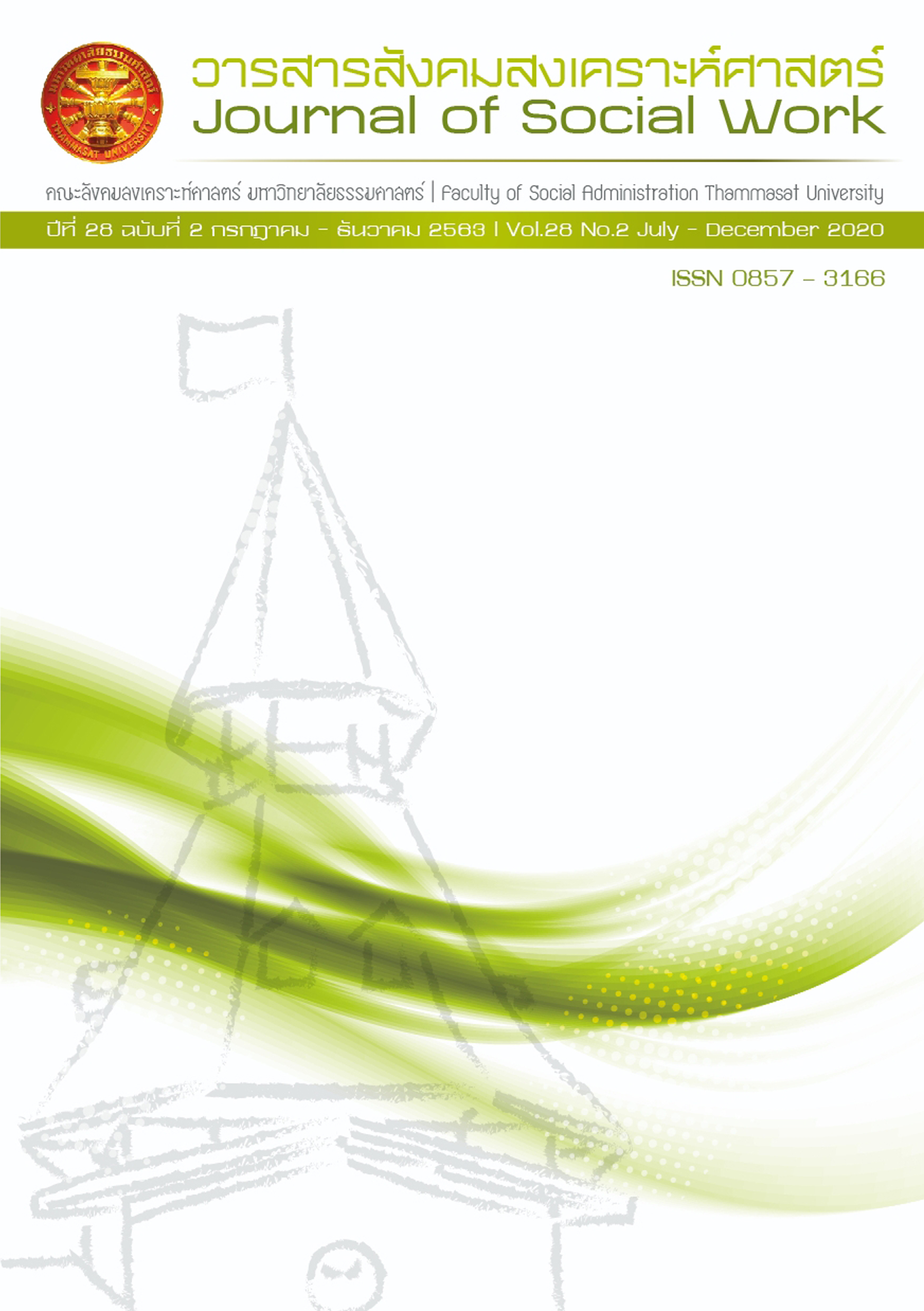Thai Family well-being Based on Family Life Cycle: South Region of Thailand
Keywords:
Family well-being, Family Life Cycle, Southern FamiliesAbstract
“Thai Family Well-being Based on Family Life Cycle: South Region, Thailand” is part of an integrated study on Thai families based on the second phase of the family life cycle. It aims at examining: (1) family life cycle or development and southern family life cycle, based on the perception of the changes in various phases of family life, taking into account an increase or decrease in the number of family members; and (2) family well-being and factors affecting family well-being in the south of Thailand. The methodology used is a research survey on a representative sample of 784 families in the south. The data analysis, the t-test and F-test values (One-way ANOVA) revealed that the sample group consisted of more females and males aged between 41 and 60 years old, with an education level lower than primary education, an average personal income of 8,826 baht/mouth and an average household income of 20,209.39 baht/month, an average age at marriage or entering into partnership of 23.11 years, and with 1 child. Most families were nuclear families. The overall well-being scores of the southern families were high for all of the 9 aspects, the highest being the spiritual aspects and self-sufficient lifestyle. Factors regarding age, educational levels, the numbers of elderly members in the family, offspring and bedridden patients had a positive correlation with family well-being, with statistical significance.Factors affecting the well-being of families in the southern region are economic status, the number of children in a family and the balance between work and family life. The study revealed that the well-being scores were highest among southern families with teenage offspring and then were in gradual decline until they reached an elderly stage, after which (over 80 years old), the well-being scores increased once again. Furthermore, the balance between work and family life has a positive effect on the well-being of the family. Recommendation are that they should be developing the family school course for family well-being care, using the family well-being assessment form 36 topics as an instruments in working with each family type and the concered agencies and also promoting the local development plan for the Southern family well-being on the spiritual.
References
กรมการปกครอง. (2557). สถิติการจดทะเบียนสมรส. สืบค้นจาก https://stat.bora.dopa.go.th/stat/marry/sk/sk_57.html
กรมกิจการสตรีและสถาบันครอบครัว. (2559). นโยบายและยุทธศาสตร์การพัฒนาสถาบันครอบครัว พ.ศ. 2560-2564. กรุงเทพฯ: กระทรวงการพัฒนาสังคมและความมั่นคงของมนุษย์, กรมกิจการสตรีและสถาบันครอบครัว.
นานัค คัควานี. (2561). กรอบแนวคิดความอยู่ดีมีสุข. สืบค้นจาก https://www.nesdb.go.th/article_attach/05dataEdit01.pdf
นิตยา คชภักดี และคณะ. (2545). รายงานโครงการพัฒนาตัวชี้วัด “ครอบครัวอยู่ดีมีสุข”. กรุงเทพฯ: มหาวิทยาลัยมหิดล, สถาบันแห่งชาติเพื่อการพัฒนาเด็กและครอบครัว.
ยุพา จิ๋วพัฒนกุล. (2556). การพยาบาลครอบครัว. นครปฐม: โรงพิมพ์มหาวิทยาลัยมหิดล.
รุจา ภู่ไพบูลย์, อรุณศรี เตชัสหงส์, ชื่นฤดี คงศักดิ์ตระกูล และจิรา อ่อนไสว. (2545). พัฒนกิจครอบครัวในการดูแลเด็กตั้งแต่วัยทารกถึงวัยรุ่น. วารสารพยาบาลศาสตร์ มหาวิทยาลัยบูรพา, 10(1), 1-14.
รุจา ภู่ไพบูลย์ และคณะ. (2558). การสังเคราะห์องค์ความรู้: การเปลี่ยนแปลงสถานภาพครอบครัวไทยและแนวทางเพื่อส่งเสริมความเข้มแข็งของครอบครัว. กรุงเทพฯ: สำนักงานกองทุนสนับสนุนการวิจัย.
รุจา ภู่ไพบูลย์ และคณะ. (2562). รายงานการวิจัยความอยู่ดีมีสุขของครอบครัวไทย: จากครอบครัวระยะเริ่มต้นจนถึงระยะสูงวัย (มาก). เอกสารประกอบการประชุม นำเสนอวันที่ 21 กุมภาพันธ์ 2562 ณ โรงแรมบางกอกพาเลส กรุงเทพมหานคร.
ศิริกุล อิศรานุรักษ์ และปราณี สุทธิสุคนธ์. (2550). การอบรมเลี้ยงดูเด็ก. วารสารสาธารณสุขและการพัฒนา, 5(1), 105-118.
สำนักงานคณะกรรมการพัฒนาการเศรษฐกิจและสังคมแห่งชาติ. (2558). แผนประชากรในช่วงแผนพัฒนาเศรษฐกิจและสังคมแห่งชาติ ฉบับที่ 11. สืบค้นจาก http//nesdb.go.th/Default.aspx?tabid=395
สำนักงานคณะกรรมการพัฒนาเศรษฐกิจและสังคมแห่งชาติ. (2561). แผนพัฒนาเศรษฐกิจและสังคมแห่งชาติ ฉบับที่ 12 (พ.ศ. 2560-2564). สืบค้นจาก http://www.nesdb.go.th/ewt_dl_link.php?nid=6422
สำนักงานสถิติแห่งชาติ. (2555). มองภาพครัวเรือนไทยในรอบ 10 ปี. สืบค้นจาก http://service.nso.go.th/nso/nsopublish/citizen/news/news_59.jsp
Bronfenbrenner, U., & Morris, P. A. (2006). The Bioecological Model of Human Development. In R. M. Lerner & W. Damon. (Eds.), Handbook of child psychology: Theoretical models of human development (p. 793–828). John Wiley & Sons Inc.
Christensen, J. (2010). Proposed enhancement of Bronfenbrenner’s development ecology model. Education Inquiry, 1(2), 101-110.
Duvall, E. M. (1977). Marriage and family development. (5th ed). Philadelphia: Lippincott, U.S.A. Elsevier Education Inquiry.
Friberg, E. E. (2019). Conceptual Foundation E-book: The Bridge to Professional. Nursing Practice of reference.
Kirst-Ashman, K. K. (2010). Service, Social Justice, and the Self: An Ecological
Perspective. from https://sites.google.com/site/socw 199wydra/ecosystems-theory.
McGoldrick, M., & Carter, B. (2003). The family life cycle. In F. Walsh (Ed.). Normal family processes: Growing diversity and complexity. New York: The Guilford Press.
Rosner, B. A. (2006). Fundamentals of Biostatistics. Thomson-Brooks/Cole.
Published
How to Cite
Issue
Section
License
The manuscripts published in the Social Work Journal is the copyright of the Social Work Journal, Thammasat University
Any article or opinion appeared in the Social Work Journal will solely be under the responsibility of the author The Faculty of Social Administration, Thammasat University and the editors do not need to reach in agreement or hold any responsibility.



